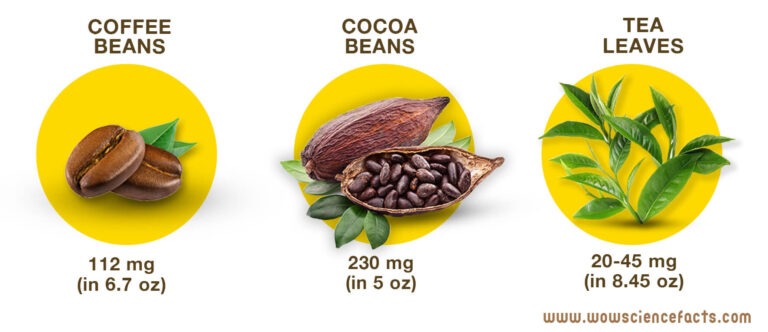Coffee is one of the most popular beverages in the world and after petroleum, it is the most traded commodity in the world. Coffee is made by brewing ground coffee beans with hot water. In this article, we will delve deeper into the stimulating effect (due to “caffeine” content) of coffee and effects on health.
What is caffeine?
Caffeine is a stimulant of the central nervous system and it can be found naturally over 60 plant species worldwide, such as coffee beans, tea leaves, and cocoa beans [table 1: link]. Further, caffein is used in many soft drinks and energy drinks as an ingredient.


In the positive side, caffeine improves your cognitive function, including memory and reaction time. It can also have the ability to increase the release of adrenaline. That is why the laziness or tiredness fades away once a cup of coffee is zipped in.
However, too much caffeine can have negative effects on your body. Consuming large amounts of caffeine can cause jitteriness, anxiety, and insomnia. It can also lead to dehydration and even can increase the risk of heart disease in some individuals.
In the positive side, caffeine improves cognitive function, including memory and reaction time. It can also increase the release of adrenaline. This is why the laziness or tiredness fading away once a cup of coffee is zipped in.
Sleep quality vs. caffeine
The National Sleep Foundation
recommends avoiding caffeine after 2pm to ensure a good night’s sleep since it can take 4 to 6 hours for your body to metabolize caffeine and reach natural level.Caffeine is a stimulant that blocks the action of adenosine, a chemical in the brain that promotes sleep. As a result, caffeine can increase alertness and reduce the amount of time it takes to fall asleep. That is good for when driving and studies to maintain the alertness.
However, in the negative side: Caffeine can interfere with your quality of sleep and causing restlessness, making it difficult to fall into a deep sleep. This affects badly for your health. You might feel tired even in the following day too.
Next, let’s see how much caffeine contains in each coffe and tea mainly and then compare caffeine content in coffee and tea and how it is affecting the stimulating effect.
How much caffeine is in a cup of coffee?
On average, an 8-ounce cup of brewed coffee contains about 95 milligrams of caffeine. However, some specialty coffees can contain much more depending on the type of bean, the brewing method, and the serving size. Also be noted that, It is important to be aware of the caffeine content in your coffee and to consume it in moderation.
In addition, coffee is also rich in antioxidants and other beneficial compounds that can have positive effects on health. Studies have suggested that moderate coffee consumption can lower the risk of certain diseases such as type 2 diabetes, Parkinson’s disease, and liver disease.
Comparison of caffeine in coffee and tea
Yes, green tea does contain caffeine. Also, the amount of caffeine in green tea can vary depending on factors such as the type of green tea, the brewing time, and the number of leaves used. On average, a cup of green tea contains around 20-45 milligrams of caffeine. Even though caffeine is included, not like in coffee, green tea also contains L-Theanine [ an amino acid which helps to counteract the jittery effects of caffeine]. Thus, by consuming green tea balances out the stimulating effect with L-Theanine it contains.

Then, it is good to know how much caffeine is included in each type of famous coffee categories and tea and other caffeine containers.
| Type | General Size | Caffeine content | Comment |
|---|---|---|---|
| Brewed Coffee | 200 ml (6.7 oz) | 112 mg | Aka: Regular coffee |
| Espresso | 50 ml (1.75 oz) | 63 mg | Consumed in small amount |
| Decaf Coffee | 250 ml (8.45 oz) | 3 mg | Not 100% caffeine free. |
| Hot chocolate | 150ml (5 oz) | 4 mg | Consumed in small amount |
| Green tea | 250 ml (8.45 oz) | 20-45 mg | Green tea also have some caffeine content |
| Cocoa | 100g | 230 mg | Cocoa powder |
How much caffeine is too much?
According to FDA, generally 400mg of caffeine per day is a safe amount for healthy adults. This will be around 4*cups of regular coffee. However, some people may be more sensitive to caffeine and should consume less. It depends on person sensitivity to caffeine and how fast they metabolize it.
Following are some of the indicators which shows that you have exceeded the daily caffeine limit for the day:
- insomnia
- jitters
- anxiousness
- fast heart rate
- upset stomach
- nausea
- headache
Further, according to the FDA, the consumption of approximately 1,200 milligrams of caffeine, can result in toxic effects such as seizures when consumed quickly.

Hope, this article provides you a basic understanding of caffeine and its effects. Even though, caffeine can have positive effects on the body, it is important to consume it in moderation to avoid negative side effects and it is highly recommended to speak with a healthcare provider before deciding your daily caffeine intake.

